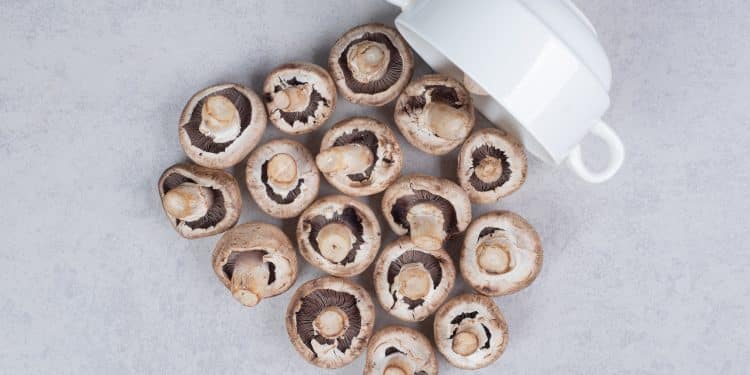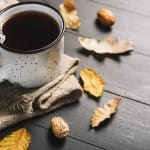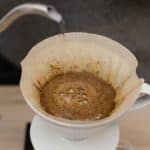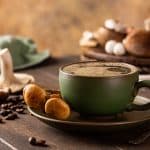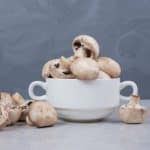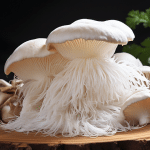The Rise of a Fungal Powerhouse
In the lush forests of Asia, a unique mushroom with cascading, icicle-like spines has been capturing the attention of healers and, now, the modern wellness community. Lion’s Mane tea mushroom, or Hericium erinaceus, has emerged from the forest floor to the forefront of health discussions.
For generations, this fascinating fungus was treasured in traditional Chinese medicine, valued not just for its striking appearance but also for its reputed health benefits. Monks consumed it to enhance brain power and warriors to boost vitality. Now, its ancient wisdom is being rediscovered as Lion’s Mane makes its way into the cups of health enthusiasts worldwide in aromatic tea.
The global spread of this mushroom’s popularity isn’t just a health trend, and a growing body of research backs it. Scientists are keenly studying its myriad compounds, finding evidence of health-promoting properties that were once only tales passed down through generations. This research has fueled a surge in the mushroom’s use, transitioning from a niche health tonic to a widely consumed beverage.
In the Western world, Lion’s Mane is now cultivated on hardwood substrates, mimicking its natural growing conditions to produce the highest quality mushrooms. This sustainable cultivation has not only made lion’s mane tea more accessible. Still, it has also raised awareness about the benefits of fungi and their potential role in our daily health regimen.
With each study published and every cup brewed, Lion’s Mane continues to cement its reputation as a wellness powerhouse. Its rise is a testament to nature’s unmatched potential in contributing to human health and the importance of traditional knowledge in guiding modern science.
Cheers to a Stronger Immune System
Each sip of this earthy infusion might be a step towards fortifying your body’s defenses. The mushroom is rich in beta-glucans, a fiber known for its immune-boosting prowess. By indulging in this beverage, you might be giving your immune system the armor it needs.
The Immune System’s Natural Ally
When we raise a cup in health’s honor, we’re seeking more than just temporary relief. What we desire is lasting, robust immunity. Lion’s mane tea may fit the bill, offering a complex arsenal of compounds to bolster our body’s defenses. Its key players are the beta-glucans, which serve as a tonic for our immune system, enhancing its function over time.
Beta-Glucans: The Immune Activators
Beta-glucans are renowned for their ability to modulate the immune system. Think of them as conductors of an orchestra, ensuring that each component of the white blood cells, like macrophages, neutrophils, and natural killer cells, performs its part harmoniously. These polysaccharides help alert the immune system, prompting a swift and efficient response to invaders.
A Synergy of Compounds
Beyond beta-glucans, lion’s mane tea is packed with other immune-boosting substances, such as polysaccharides and glycoproteins. Together, they enhance the tea’s potential to maintain a vigilant immune system. It’s the combined effect of these compounds that makes Lion’s Mane not just a beverage but a potent contributor to immune health.
Balancing the Inflammatory Response
An overzealous immune response can lead to excessive inflammation, often causing more harm than good. Tea contains elements that help to fine-tune this response, promoting an immune system that acts when necessary but doesn’t overreact, maintaining a delicate equilibrium essential for good health.
A Daily Defense Strategy
Integrating lion’s mane tea into your daily routine could be akin to setting up a watchtower within your immune system. Each cup is a reminder of the body’s need for vigilance against illness. This humble tea may not be a cure-all, but it’s a tasty, comforting way to support a healthy, responsive immune system.
Brewing Your Cup of Wellness
Preparing a lion’s mane tea is an art and a journey into well-being. The process starts with the dried Lion’s Mane mushroom or a fine powder, which you steep in hot water. The key is patience—allow the tea to brew slowly, unfurling the complex flavors and releasing the beneficial compounds into your cup.
Customizing Your Lion’s Mane Tea
Tea is naturally earthy, but its flavor can be adapted to different tastes. Let’s break it down in more detail:
- Begin with the base, dried Lion’s Mane mushroom or a grounded powder, and submerge it in hot water to extract its essence;
- For a hint of sweetness, consider a drizzle of honey. It complements the earthy tones and adds a silky texture;
- Ginger slices can introduce a warming, spicy undertone, perfect for invigorating the senses;
- Sprinkle some cinnamon to your tea to amplify its warmth, ideal for those chilly mornings or evenings;
- A pinch of turmeric can transform your beverage into a golden-hued tonic, adding its own set of benefits and a vibrant color.
Remember, it all depends on your taste preferences. Choose wisely, and your tea will give you maximum pleasure.
Digestive Health in a Teacup
Lion’s Mane mushroom, scientifically known as Hericium erinaceus, is not only a cognitive enhancer but also a digestive tonic. When we transform this mushroom into tea, we aren’t just brewing a beverage. We’re crafting a cup filled with gastrointestinal benefits.
The tea, with its mild and earthy flavor, is thought to contain natural compounds that may act as a soothing agent for the gut. It’s been used traditionally in many cultures, not just as a food but also as a remedy for maintaining a healthy digestive tract. This is likely due to its content of polysaccharides, like the beta-glucans above, which nourish good gut bacteria, and its anti-inflammatory properties that might help manage conditions like gastritis.
The Final Word
Dive into the world of lion’s mane tea, and you might just find more than a delightful beverage. Each cup carries the potential for enhanced cognitive function, immune support, digestive health, and so much more. It’s a simple habit that could profoundly affect your overall well-being. So why not let this fungus be your fungi and steep yourself a cup today?

